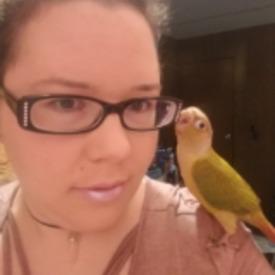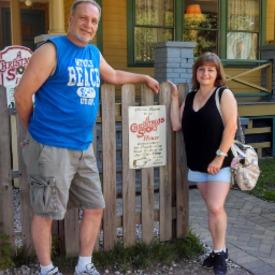Do you weigh your food?

leanne9876
Posts: 301 Member
I didn't think I would need scales but I'm starting to realise I do really need them. It's getting hard to try and estimate everything.
It's getting to track my food when I can't find things and I don't know what they weigh.
It's easy if I buy food that has the info on it, but when I get meat/ham/chicken from the butcher or deli how I am supposed to track that?
Do you weigh the food before or after cooking ?
It's getting to track my food when I can't find things and I don't know what they weigh.
It's easy if I buy food that has the info on it, but when I get meat/ham/chicken from the butcher or deli how I am supposed to track that?
Do you weigh the food before or after cooking ?
0
Replies
-
I weigh my food. It makes the calorie counting a lot more accurate. It's definatly something I am glad I invested in.0
-
When you buy a scale, it doesn't have to be anything expensive, I bought a digital scale for £7. It is amazing when you see what an actual portion is. I was eating healthy muesli cereal and just poured into my bowl what I thought was a serving. Ooops it wasn't, I was way over eating it. Now I put my bowl on the scale and weigh out the 45 grams that is a serving.0
-
I use measuring cups more than my scale, but the option is there. It depends on if the package says "1/2 cup" or "2 oz" is the serving.
As far as how you know? You can never be sure. When purchasing deli meats, make sure you write down the brand name and internet search it later.
When all else fails, I will try to find something similar or generic, and use those values, plus half. So I would put "1 1/2" servings instead of the 1 that I eat. I'd rather have a small deficit than be wrong and have a small overage.0 -
I just estimate. I figure I only need to be accurage on average.
 Also, I eat out a lot, so it's not always practical.
Also, I eat out a lot, so it's not always practical.
Then again, a lot of people on here find it to be very helpful, so go for it!0 -
Absolutely! It's impossible to be accurate with most foods unless you weigh them.0
-
I weigh everything every day. It really helps. A good digital scale that switches between ounces and grams is a good way to go.0
-
I weigh every single thing I eat. My liquids, my fruits and veggies, pb, meat, every single thing. It makes thing more accurate.
You should weigh ur meat b4 cooking it, cuz it will often shrink when u cook it.0 -
Depends on your calorie chart and on how you cook it, for example: Porridge0
-
I also thought it was unnecessary but just bought one this last week and it's made a massive difference to my serving sizes. And there are cheap ones out there. So what if it's a gram or two out? Way better than guessing!0
-
Yeah I weigh my food and I use cups to measure out portions for things like rice and oatmeal. The sort of stuff I eat though it's not really that hard to mess up.0
-
Yeah, I weigh my food most of the time. A few things I measure out with measuring cups, but most of the time I use a food scale which I have grown quite attached to, haha. I didn't use one during previous weight loss attempts but nowadays I've found it just makes things a lot easier for me. I went to a family party today (we don't live around most of our family so it's an hour and a half (or more, with traffic) drive to get there), and it wasn't until we arrived that I realized I had forgotten my scale at home. Luckily one of my aunts has one as well and brought it over for me to use, which was good because there were a couple of things (like a horribly unhealthy but unreasonably delicious fruit salad thing made with cool whip that my family really loves) that I know how many grams of the stuff is in a serving, but had no clue what that would've equated to in cups.0
-
I have heard guessing with meat that it needs to just fit in the palm of your hand. I personally weigh and measure everything. down to the teaspoon. I don't have a digital but a small spring scale. when I meaure weight on anything I put a small plate or paper plate on it first and "zero" it out then add the item that may be hard to weigh because of its density, (Chipped meat for instance) . However I still have a problem of weighing before cooking. Yes, it shrinks, and the extra juices and fat will come out of it while broiling or cooking, That surely makes it less in cals by the time it hits your mouth. the leaner meats I weigh before, anything that could shrink making it lose its juices or water , I weigh after.
I refuse to give up my peanut butter so instead of a knife, I take a teaspoon to spread it or jam mayo, sour cream etc. I measure with my baking cups mashed potatoes, log it plain then divide in portions on my logging anything extra that go in them like butter or milk. Fverything is close at had so when I fix my plate its right there to do it.0 -
Meat, cheese, etc is quite easy, as you know what the package weighs, and how much of it you eat. If you have a 500 gram package with 4 chicken breasts in it, each one is 125 grams. If you don't want to start weighing your food, keep reading the labels and keep remembering what you buy and how much you use. If you cook for a whole family, estimate your share after you have done the maths for the whole meal - as long as you're honest with yourself about what you actually eat, that should work just fine. Another wonderful tool in MFP is the option to save your own recipes. That way you can easily track your most common foods, without weighing it.
I believe the scale is most important in order to learn to track and estimate portions. We tend to under- or over-estimate portions due to lack of practice. I have used my scale very actively in periods to figure out for instance: how much does one of my own handfuls of peanuts weight? (In my case, 15 grams.)
On the other hand, since I cook and particularly bake regularly, I don't think a kitchen is complete without a scale. I use mine almost every day, even if I don't use it specifically for my own food.0 -
I weigh before cooking. Its scary to see how much cereal you think 30g is until you weight it it's hardly anything! I tend to grate things like cheddar as it goes further0
-
I weigh and measure everything except lettuce, carrots, radishes...those things are so low in calories it doesn't matter if I over or underestimate.0
-
Since I have been weighing my food, it has also helped me when eating out because I have more realistic ideas of what a 'portion' should look like on the plate. Previously, what I had thought was a nice healthy portion of say cheese, was actually way too much!
Give it a go, it may help.0 -
I measure all my food in one way or another. Examples:
- If I buy a pack of 4 chicken breast weighing 550 grams I don't weight them all individually. I live alone and will eat them all myself = accuracy over 4 days. Same with a manually entered recipe, I know it makes 5 servings and I box it in 5 tupperware but I don't bother noting small discrepancies between them; accuracy over time.
- I weigh my lettuce every day, especially important as I buy different mixes so they don't look the same volume wise.
- I weighed my oatmeal (50 g dry) in a measuring cup, so now I know that one serving equals 1/2 cup dry. This is useful for speeding up breakfast.
- I measure condiments in tablespoon measures (15 ml)
- I weigh my fruit; for example I bought small apples (Tesco Fun Size) and the serving on MFP was 100g, however not a single apple in there weighed more than 80g. I eyeballed, thought i saw a discrepancy and weighed to verify.0 -
No, cos I think life is too short.
But if it works for you why not. Even if it's only for a while to get you used to what is a proper portion size and eventually you will be able to look at it and tell without weighing.0 -
I definitely use a scale!0
-
I have heard guessing with meat that it needs to just fit in the palm of your hand. I personally weigh and measure everything. down to the teaspoon. I don't have a digital but a small spring scale. when I meaure weight on anything I put a small plate or paper plate on it first and "zero" it out then add the item that may be hard to weigh because of its density, (Chipped meat for instance) . However I still have a problem of weighing before cooking. Yes, it shrinks, and the extra juices and fat will come out of it while broiling or cooking, That surely makes it less in cals by the time it hits your mouth. the leaner meats I weigh before, anything that could shrink making it lose its juices or water , I weigh after.
I refuse to give up my peanut butter so instead of a knife, I take a teaspoon to spread it or jam mayo, sour cream etc. I measure with my baking cups mashed potatoes, log it plain then divide in portions on my logging anything extra that go in them like butter or milk. Fverything is close at had so when I fix my plate its right there to do it.
You know I don't get the weighing where a serving is say... 1/4 cup or 1 tbls. Come to think of it I have no idea what a Tbls of a given substance would weigh. Also wouldn't a Tbls of butter perhaps have a different weight than a Tbls of say vanilla?
I don't have a food scale but I am planning to purchase one for weighing meats mostly but I'm sure there will be other things as well0 -
I weighed everything for a few weeks when i was starting, then my scales broke.
Now i guestimate and add 20%.
(i heard that ppl underestimate what they eat by 20%)
Its kinda weird though, i'll have some peanut butter on a knife and go is that a teaspoon or 1 1/2?, then when i log it its in g's so i need to convert it back.
I will say that weighing stuff when you are starting, or new stuff really does help you to see how much you are eating and how much you should est.0 -
I weigh everything every day. It really helps. A good digital scale that switches between ounces and grams is a good way to go.
^^ this 0
0 -
I weigh after it is cooked. Because I figure if you pat the grease off and It does shrink you are not eating as much as you put in the pan.0
-
The scale really opened my eyes to how much I was eating.0
-
I have a digital scale that weighs in both grams and ounces .I use them every day. They are a great tool and a big help. I weigh and measure everything. I weigh my meat after cooking. The calories I am consuming are in the cooked meat not the raw meat.0
-
A food scale was a must for me, as is measuring everything out. It's amazing how inaccurate many product labels are. If I buy a bag of chicken breasts that are supposed to weigh 4 lbs each, I weigh each one (always before cooking) I have found that it can range from 3.75 to 4.15 lbs (as an example). Campbells roadhouse chili - there is actually one less serving in the can than it says on the label. If I didn't measure and weigh stuff out, I'd never know that. My kitchen scale weighs in 4 or 5 different measurements - I love it!0
-
It's easy if I buy food that has the info on it, but when I get meat/ham/chicken from the butcher or deli how I am supposed to track that?
I asked my deli if they had the nutritional info for their items. She handed me a small booklet that had many of the meats and cheese that i like with all the info. Sometimes all u have to do is ask.0 -
Always,the scales don't lie.if I was to do it by eye I eat more when im hungry0
-
I try to weigh or measure everything. I find if I don't I don't lose as well.0
-
You should weigh ur meat b4 cooking it, cuz it will often shrink when u cook it.
I weigh my meat after cooking, especially beef, as a good bit of fat and juices cook away and are not consumed. I weigh pasta before cooking because the longer it is cooked the more water is absorbed and the heavier it weighs, though there is no calorie increase.0
This discussion has been closed.
Categories
- All Categories
- 1.4M Health, Wellness and Goals
- 397.1K Introduce Yourself
- 44.2K Getting Started
- 260.9K Health and Weight Loss
- 176.3K Food and Nutrition
- 47.6K Recipes
- 232.8K Fitness and Exercise
- 457 Sleep, Mindfulness and Overall Wellness
- 6.5K Goal: Maintaining Weight
- 8.7K Goal: Gaining Weight and Body Building
- 153.4K Motivation and Support
- 8.3K Challenges
- 1.3K Debate Club
- 96.5K Chit-Chat
- 2.6K Fun and Games
- 4.6K MyFitnessPal Information
- 16 News and Announcements
- 18 MyFitnessPal Academy
- 1.4K Feature Suggestions and Ideas
- 3.1K MyFitnessPal Tech Support Questions


























